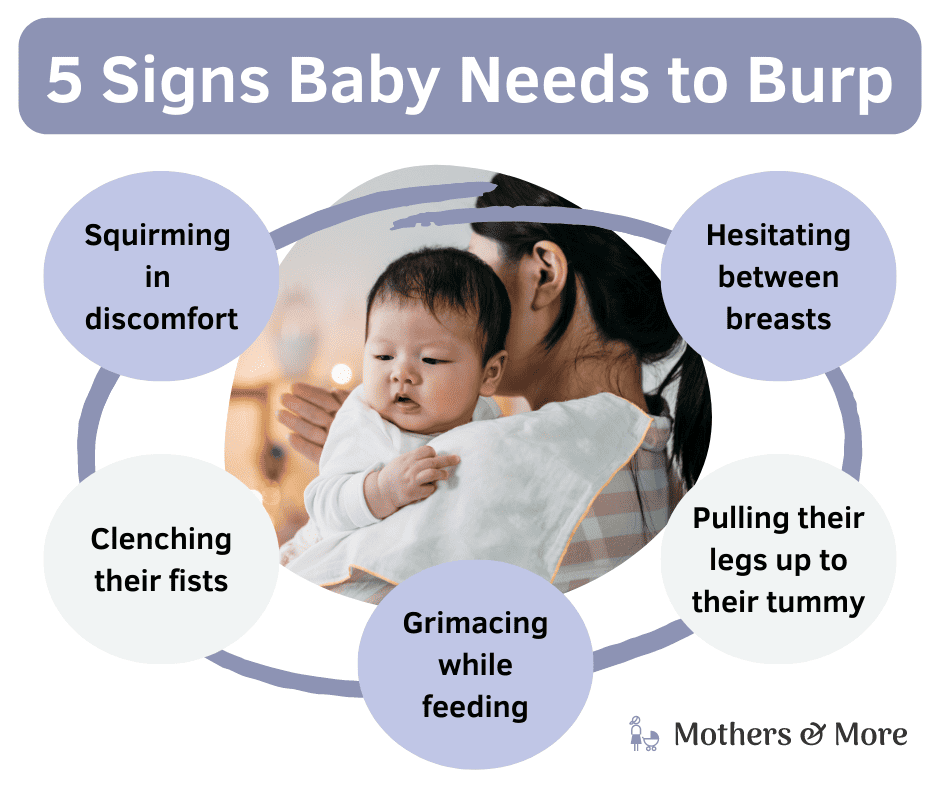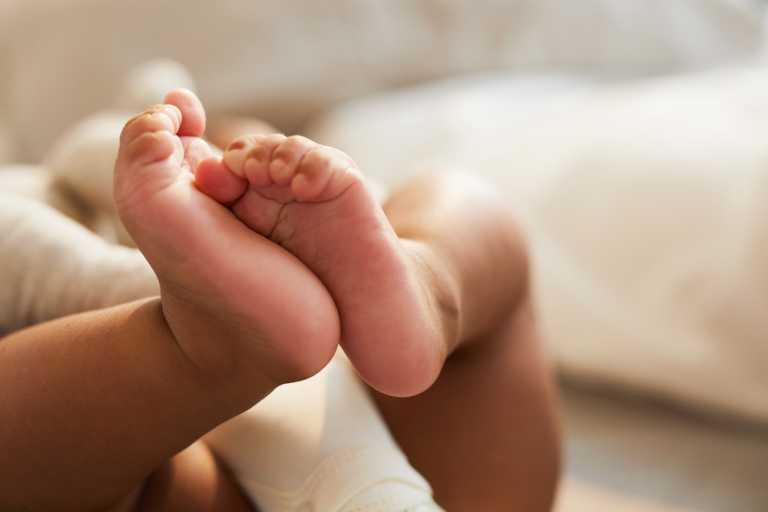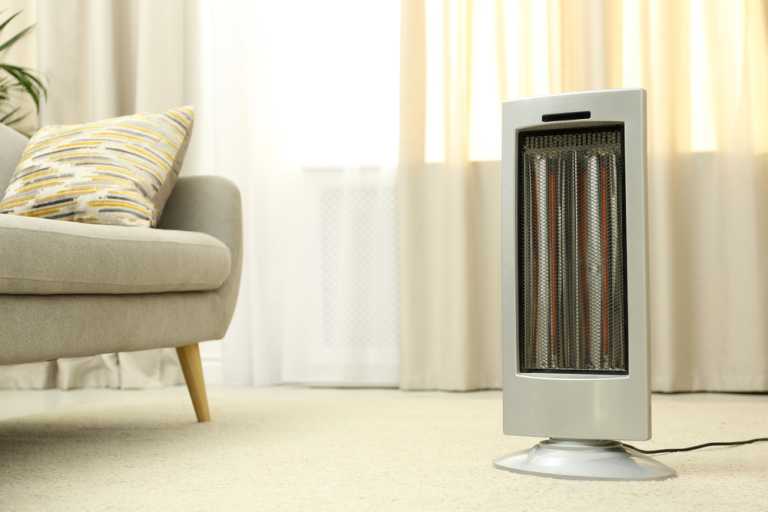It’s 2 a.m., your baby has drifted off while feeding, and you both desperately need to get back to bed. But is it OK to put them to sleep without burping?
The good news is, yes, it’s totally safe as long as you follow the usual SIDs guidance and place them on their back.
However, you do risk them waking up gassy and uncomfortable later. For this reason, it’s always best to try to burp them for just 5 minutes.
But don’t worry; we’ll teach you how to do it without waking them and how to avoid those troublesome bubbles in the first place.
What Happens if You Put a Baby to Sleep Without Burping?
If you put your little one to sleep without burping, one of two things will happen:
- They’ll Sleep Peacefully Until They’re Hungry Again
Even if your little one needs burping throughout the day, you might find that their sleepy, slow night feeds don’t produce as much gas. This means you can skip the bedtime burps from now on.
- They’ll Become Fussy and Restless
If you put your little one to sleep without burping, they may experience discomfort due to trapped gas bubbles. These bubbles can be painful and may cause your baby to spit up if they are not released. This discomfort can make your little one fussy and restless, and they may wake up crying.
Fortunately, your baby likely falls into one category or the other; they won’t switch it up each night. So, if you struggle to get a burp one evening, try putting them to bed and see what happens. They may surprise you.
Is It Safe to Put a Baby to Sleep Without Burping?
Many parents worry their baby will choke if they spit up at night. However, babies have an excellent gag reflex and can easily spit out or swallow any milk that comes up in their sleep.
So, yes, it is completely safe to put your baby down without burping. One study even found that skipping the burp reduced regurgitation.
What Are the Signs a Baby Needs to Burp?

Of course, just because it’s safe doesn’t mean it’s comfortable. Look out for these signs that mean your little one needs to burp:
- Pulling away or stopping mid-feed
- Squirming in discomfort
- Pulling their legs up to their tummy
- Clenching their fists
- Grimacing during feeding
- Hesitating between breasts
How to Burp a Baby Without Waking Them Up
Once you’ve figured out that your little one needs to burp, the next job is to do it without waking them.
Of course, in an ideal world, you should wake them, as putting a baby to bed sleepy but awake is good to encourage self-soothing. However, we’re all human and don’t always want to practice sleep routines at 2 a.m. We just want to get back to bed as quickly as possible.
So what do you do if they’ve fallen asleep while feeding, and you don’t want burping to wake them up? Try one of these 6 sleep-friendly burping techniques:
- Burp Them Mid-Feed
Don’t wait until the end of the feed to burp them. Instead, try halfway through the bottle or when you switch breasts. This means that if you do wake them, they’ll have half a feed to fall back asleep.
- Hold Them Upright on Your Chest
After their feed, gently move them into an upright position on your chest. This will put pressure on their abdomen and allow any bubbles to rise to the top. You may be tempted to pat their back, but don’t. Instead, gently rub in an upward motion.
- Use Movement
With your little one upright on your chest, move slowly. This could be rocking on a nursing chair or standing and swaying. The added motion will encourage the bubble to come up, and the movement will soothe your little one.
- Use the Sloth or Football Hold
After feeding, gently roll your baby to face outward along your forearm. Their head should lie in the crook of your elbow, and an arm and leg should dangle on each side of your arm. This position will put pressure on their tummy and might produce a burp.
- Lay Them Tummy Down Across Your Lap
Place them tummy-down on your lap and gently support their head and chest. Their mouth must be higher than their stomach to let the bubble out.
- Put Them Down and Pick Them Up
Lie them down in their crib for 5 minutes, then pick them up again. This gives time for the bubbles to gather, and a burp may fire out as soon as you lift them.
What Happens if Your Baby Won’t Burp Before Sleeping?
If you’ve tried all the techniques and your little one still won’t burp, it probably means they don’t need to. A good rule of thumb is to spend no more than 5 minutes burping before giving up.
If gas pains still bother them, you may need to look into other issues besides the nighttime burp.
For example:
If You Are Bottle-Feeding:
Check Teat Size
A teat that’s too large will allow the milk to come out too fast, leading to gasping. Too small, and your tot may take in extra air as they struggle to drink.
Switch Bottle Brand
Not all babies do well with the same type of bottle. So, switching to a different brand may solve all of your gas pain issues.
Try a Filtration or Anti-colic Bottle
Some brands advertise bottles specifically to reduce problems with gas and colic. Although they’re usually more expensive, it might be worth a try.
Position the Bottle Correctly
Hold the bottle at an angle rather than up and down, and ensure the teat is always full of milk. This will provide a good flow speed and stop your little one from taking in too much air.
If You Are Breastfeeding:
Check the Latch
Having a poor latch will mean that your little one takes in air as well as milk. To avoid this, check the following:
- Feeding is comfortable and pain-free.
- You can see little or no areola.
- Your baby’s lips are turned out like a fish.
- Your baby’s tongue is cupping under your breast.
- Their chin is touching your breast.
- Their ears move as they drink.
If you struggle to improve the latch by yourself, contact a lactation consultant. They will be happy to help.
Try the Clutch or Football Hold
In the traditional cradle position, your little one will feed lying down, which can trap gas bubbles. Instead, try the clutch hold, which allows them to feed in a more upright position.
How to do it:
- Hold your baby at your side, facing you.
- Tuck their legs under your arm.
- Support their head and back with your hand and forearm.
- Bring their nose to your nipple, and they should latch on.
For Bottle and Breast Fed Babies:
Consider Allergies
Cow’s milk protein allergy is common among infants and can present with colic, reflux, gas pains, and eczema-like rashes. This can affect breastfed babies, too, if the mother consumes dairy products.
If your little one is bottle-fed, see your pediatrician. They can diagnose the allergy and prescribe a safe formula.
If you’re breastfeeding, keep a diary of your diet and their symptoms and check for patterns. Common allergens that can pass through breast milk include soy, wheat, and eggs. You may need to give up the allergen for several days before seeing results.
Consider Reflux
Gastroesophageal reflux Disease, or GERD, is a condition where stomach acid damages your baby’s esophagus. This causes trouble with feeding, sleeping, and weight gain, as well as irritability and vomiting.
If you suspect this, contact your healthcare provider. They can prescribe medication to weaken the stomach acid so your little one’s esophagus can heal.
FAQs
How Long After Feeding Can I Put My Baby Down to Sleep?
If your little one has no medical issues, you can put them down as soon as they burp or after 5 minutes of trying to burb them.
If they have reflux, the current advice is to wait 30 minutes before laying them down.
When Should I Stop Burping My Baby at Night?
Most babies become strong enough to burp themselves between 4 and 6 months. However, as all babies develop at different rates, your little one may be ready as young as 2 months or could take a little longer.
Signs That You Can Stop Burping Your Baby Include:
- They are sitting independently.
- They are strong enough to pull away and sit up during feeds.
- They show no signs of discomfort when you don’t burp them.
What Should I Do if My Baby Won’t Burp After 20 or 30 Minutes?
Only try burping your baby for 5 minutes at a time. If you’ve had no success, lie them down for 5 minutes and try again with a different technique. If that still produces nothing, they probably don’t need to burp.




